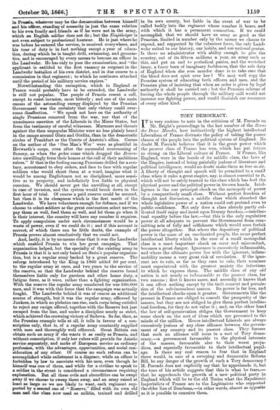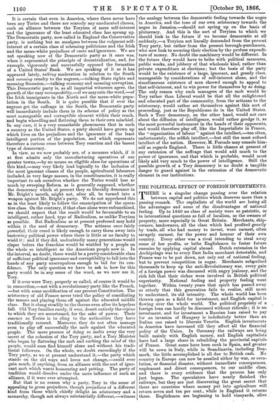TORY DEMOCRACY.
IT is very curious to note in the criticism of M. Forcade on Mr. Bright's proceedings in the last number of the Revue des Dear Mondes, how instinctively the highest intellectual Liberalism of France distrusts the policy of taking the poorer classes of the people into the political system of England. No doubt M. Forcade believes that it is the great power which the poorest class of France has won, which has put fetters so strong on the Liberal culture of France. If France, like England, were in the hands of its middle class, the laws of the Empire, instead of being painfully jealous of literature and political intelligence, would no doubt make them as free as air. A liberty of thought and speech will be permitted to a small class when it rules a great empire, nay, is almost essential to it, which will not be safely trusted to the class which has both the physical power and the political power in its own hands. Intel- ligence is the one principal check on the monopoly of power by a comparatively small class. Without perfect freedom of thought and discussion, a middle class which absorbed the whole legislative power of a nation could not pretend even to public confidence. Not only does a class already partly cul- tivated itself enjoy and insist upon literary freedom,—intellec- tual equality before the law,—but this is the only regulative power at all adequate to prevent the Government from com- ruitting acts of folly and selfishness which would soon forfeit the power altogether. But where the depository of political power is the mass of an uneducated people, the same perfect intellectual liberty which in the case of a small monopolist class is a most important check on error and misconduct, becomes a great danger. Ignorance is excessively inflammable, and where the ultimate power lies with the ignorant, inflam- mability means a very great risk of revolution. If the igno- rant are to rule, so far as they care to rule, their nominee must superintend with the greatest anxiety the infections to which he exposes them. The middle class of any old nation is not nearly so inflammable as the poorest class, for two reasons ; first it knows more, and secondly it knows that it can effect nothing except by the tacit consent and permis- sion of the sub-incumbent masses. Its power is far less, and the intellectual checks upon it greater. Governments like the present in France are obliged to consult the prosperity of the masses, but they are not obliged to give them perfect intellec- tual freedom, for they do not value it ; and, on the other hand the law of self-preservation obliges the Government to keep some check on the sort of ideas which are presented to the minds of the million. Hence intellectual Liberals are always excessively jealous of any close alliance between the govern- ment of any country and its poorest class. They foresee that such an alliance will issue in a sort of Tory demo- cracy,—a government favourable to the physical interests of the masses, favourable also to their worst preju- dices, and especially favourable to their intellectual pupil- age. Is there any real reason to fear that in England there would, in case of a sweeping and democratic Reform Bill, be any danger of the growth of such. a Tory democracy ? M. Forcade does not explicitly say that he apprehends it, but the tone of his article suggests that this is what he fears,— that he apprehends the growth of a new political party in England which will be to the old Tories what the Napoleonic Imperialists of France are to the Legitimists who supported the elder line of Bourbons,--in other words, almost as opposite as it is possible to conceive them.
It is certain that even in America, where there never have been any Tories and there are scarcely any uneducated classes, such an alliance between the Toryism of mere self-interest and the ignorance of the least educated class has sprung up. The Democratic party, now called in England the Conservative
• party, is nothing but an amalgam between the vulgarest self- interest of a certain class of scheming politicians and the Irish and the mean-white prejudices of caste and ignorance. We are not speaking now of the Democratic party as it once was, when it represented the principle of decentralization, and, for example, vigorously and successfully opposed the formation of a United States' Bank. We are speaking of it as it has appeared lately, talking moderation in relation to the South and meaning cruelty to the negroes,—talking State rights and meaning Secession,—talking economy and meaning corruption.. This Democratic party is, as all impartial witnesses agree, the growth of the easy manageability,—if we may coin the word,—of the Irish immigrants in the North and the mean-white popu- lation in the South. It is quite possible that if ever the negroes get the suffrage in the South, the Democratic party will immediately include them in its scheme of policy as the most manageable and corruptible element within their reach, and begin wheedling and flattering them to their own mischief.
• In any case, it is a very remarkable phenomena that in such a country as the United States, a party should have grown up which lives on the prejudices and the ignorance of the least intelligent portion of the population, and which represents therefore a curious cross between Tory reaction and the basest type of democracy.
In view, as we now probably are, of a measure which, if it at first admits only the manufacturing operatives of our greater towns,—by no means an eligible class for operations of this kind,—may very likely lead logically to the inclusion of the most ignorant classes of the people, agricultural labourers included, in very large masses, in the constituencies, it is really important to ask ourselves whether the Tories would lose as much by sweeping Reform as is generally supposed, whether the democracy which at present they so liberally denounce in Mr. Thight's mouth, might not, after all, be turned into a weapon against Mr. Bright's party. We do not apprehend this as in the least likely to follow the emancipation of the opera- tive class. On the contrary, if that class alone were enfranchised, we should expect that the result would be favourable to an intelligent, rather hard, type of Radicalism, as unlike Toryism as possible. But Radicalism as at present professed may hold within it the seed of democracy. The artizans once fairly powerful, their creed is likely enough to carry them away into bestowing political power where there is little or no faculty to wield it ; and if they did, undoubtedly many generations would elapse before the franchise would be wielded by a people on the whole so intelligent as the American people now is. In the interval, no doubt, there would be a pretty considerable class of sufficient political ignorance and corruptibility to fall into the hands of any party unscrupulous enough to bid for its con- fidence. The only question we have to ask is, how far this party would be in any sense of the word, as we now use it, Tory.
If it ever were Tory, properly so called, of course it would be in connection,—not with a revolutionary party like the French, —but with some modification of our present Constitution. The aristocracy of old France never tried the policy of conciliating the masses and playing them off against the educated middle class. But it clung steadily to the throne even after its hopeless • fall. Old Tory families rarely, if ever, desert entirely the re'gime to which they are accustomed, for the sake of power. Their essence as Tories is to cling to the authorities they have traditionally revered. Moreover, they do not often manage even to play off successfully the mob against the educated people. The mere process of doing so melts away the very • secret of the cohesion of the Tory party, and a Tory Minister who began by flattering the mob and curbing the mind of the people, would soon find himself alone and without his tradi- tional followers. On the whole, we doubt exceedingly if the Tory party, as we at present understand it,—the party which stands on the old ways and loves not change,—could ever gain much, if anything, from an affiance with the sort of igno- rant mob which wants humouring and petting. The party of tradition would dissolve under the mere influence of such an alliance, if it were ever attempted. But that is no reason why a party, Tory in the sense of appealing to gross prejudices, though prejudices of a different kind from those which chiefly delight an aristocracy and a monarchy, though not always substantially different,—'witness the analogy between the democratic feeling towards the negro in America, and the tone of our own aristocracy towards the negro in Jamaica,—should not spring up on the basis of plutocracy. And this is the sort of Toryism to which we should look in the future if we become democratic at all suddenly,—a Toryism not lineally descended from the present Tory party, but rather from the present borough-purchasers, who now look to securing their election by the profuse expendi- ture of money. No doubt the machinery would be different. In the future they would have to bribe with political measures, public works, and jobbery of that wholesale kind, rather than private expenditure at elections ; but the basis of the party would be the existence of a large, ignorant, and greedy class, manageable by considerations of self-interest alone, and the simultaneous existence of men shrewd enough .to appeal to that self-interest, and to win power for themselves by so doing. The only reason why such managers of the mob would be Tory rather than Liberal would be that all the enlightened and educated part of the community, from the artisans to the aristocracy, would rather set themselves against this sort of proceeding, just as the Republicans do in the United States. Such a Tory democracy, on the other hand, would not care about the diffusion of intelligence, would rather grudge it, as the most powerful instrument in the hands of their opponents, and would therefore play off, like the Imperialists in France, the "organization of labour" against the intellect,—too often, unfortunately, the selfish intellect,—but still the most refined intellect of the nation. However, M. Forca,de may console him- self as regards England. There is little chance at present of any extension of the suffrage that would add much to the power of ignorance, and that which is probable, would most likely add very much to the power of intelligence. Still the possible growth of a Tory democracy is no doubt a tangible danger to guard against in the extension of the democratic element in our institutions.































 Previous page
Previous page